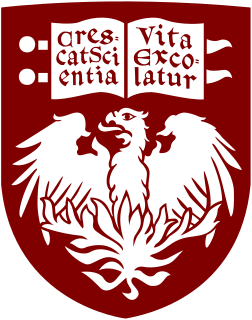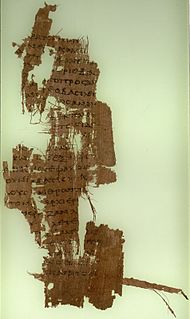
In Christian theology, the Immaculate Conception is the conception of the Virgin Mary free from original sin by virtue of the merits of her son Jesus. The Catholic Church teaches that God acted upon Mary in the first moment of her conception, keeping her "immaculate".

Catholic Mariology refers to Mariology—the systematic study of the person of Mary, mother of Jesus, and of her place in the Economy of Salvation—within Catholic theology. Mary is seen as having a singular dignity above the saints. The Catholic Church teaches that she was conceived without original sin, therefore receiving a higher level of veneration than all other saints. Catholic Mariology thus studies not only her life but also the veneration of her in daily life, prayer, hymns, art, music, and architecture in modern and ancient Christianity throughout the ages.

Anglican Marian theology is the summation of the doctrines and beliefs of Anglicanism concerning Mary, mother of Jesus. As Anglicans believe that Jesus was both human and God the Son, the second Person of the Trinity, within the Anglican Communion and Continuing Anglican movement, Mary is accorded honour as the theotokos, a Koiné Greek term that means "God-bearer" or "one who gives birth to God".
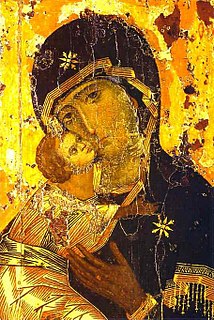
Mariology is the theological study of Mary, the mother of Jesus. Mariology methodically relates teachings about her to other parts of the faith, such as teachings about Jesus, redemption and grace. Christian Mariology aims to connect scripture, tradition and the teachings of the Catholic Church on Mary. In the context of social history, Mariology may be broadly defined as the study of devotion to and thinking about Mary throughout the history of Christianity.

Protestant views on Mary include the theological positions of major Protestant representatives such as Martin Luther and John Calvin as well as some modern representatives. While it is difficult to generalize about the place of Mary, mother of Jesus in Protestantism given the great diversity of Protestant beliefs, some summary statements are attempted.
Karl Barth's views on Mary agreed with much Roman Catholic dogma but disagreed with the Catholic veneration of Mary. Barth, a leading 20th-century theologian, was a Reformed Protestant. Aware of the common dogmatic tradition of the early Church, Barth fully accepted the dogma of Mary as the Mother of God. Through Mary, Jesus belongs to the human race. Through Jesus, Mary is Mother of God.

The history of Catholic Mariology traces theological developments and views regarding Mary from the early Church to the 21st century. Mariology is a mainly Catholic ecclesiological study within theology, which centers on the relation of Mary and the Church. Catholic Mariology is the encyclopedic area of theology concerned with Mary, the Mother of God. Theologically, it not only deals with her life, but her veneration in daily life, prayer, art, music, architecture, in modern and ancient Christianity throughout the ages.

Throughout history Roman Catholic Mariology has been influenced by a number of saints who have attested to the central role of Mary in God's plan of salvation. The analysis of Early Church Fathers continues to be reflected in modern encyclicals. Irenaeus vigorously defended the title of "Theotokos" or Mother of God. The views of Anthony of Padua, Robert Bellarmine and others supported the doctrine of the Immaculate Conception of the Virgin Mary, which was declared a dogma in 1850.

The Mariology of the popes is the theological study of the influence that the popes have had on the development, formulation and transformation of the Roman Catholic Church’s doctrines and devotions relating to the Blessed Virgin Mary.

John Calvin (1509–1564) was a French Protestant theologian during the Protestant Reformation, and one of the most influential reformers. He was a central figure for the Reformed churches, whose theological system is sometimes called Calvinism.

Luther's Marian theology is derived from his views of Mary, the mother of Jesus. It was developed out of the deep Christian Marian devotion on which he was reared, and it was subsequently clarified as part of his mature Christocentric theology and piety. Lutherans hold Mary in high esteem. Martin Luther dogmatically asserted what he considered firmly established biblical doctrines like the divine motherhood of Mary while adhering to pious opinions of the Immaculate Conception and the perpetual virginity of Mary along with the caveat that all doctrine and piety should exalt and not diminish the person and work of Jesus Christ. By the end of Luther's theological development, his emphasis was always placed on Mary as merely a receiver of God's love and favor. His opposition to regarding Mary as a mediatrix of intercession or redemption was part of his greater and more extensive opposition to the belief that the merits of the saints could be added to those of Jesus Christ to save humanity.

In the Catholic Church, the veneration of Mary, mother of Jesus, encompasses various Marian devotions which include prayer, pious acts, visual arts, poetry, and music devoted to the Blessed Virgin Mary. Popes have encouraged it, while also taking steps to reform some manifestations of it. The Holy See has insisted on the importance of distinguishing "true from false devotion, and authentic doctrine from its deformations by excess or defect". There are significantly more titles, feasts, and venerative Marian practices among Roman Catholics than in other Western Christian traditions. The term hyperdulia indicates the special veneration due to Mary, greater than the ordinary dulia for other saints, but utterly unlike the latria due only to God.
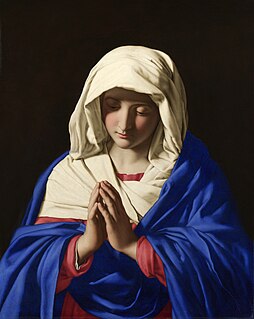
Ecumenical meetings and documents on Mary is a review of the status of Mariology in the Orthodox, Protestant, Anglican, and Roman Catholic Churches, as a result of ecumenical commissions and working groups.
Mark Miravalle is a professor of theology at Franciscan University of Steubenville, specializing in Mariology. He is president of Vox Populi Mariae Mediatrici, a Catholic movement promoting the concepts of the Blessed Virgin Mary as Mediatrix and Co-Redemptrix.

The Blessed Virgin Mary has been one of the major subjects of Western Art for centuries. Numerous pieces of Marian art in the Catholic Church covering a range of topics have been produced, from masters such as Michelangelo and Botticelli to works made by unknown peasant artisans.

Roman Catholic Marian music shares a trait with some other forms of Christian music in adding another emotional dimension to the process of veneration and in being used in various Marian ceremonies and feasts. Marian music is now an inherent element in many aspects of the veneration of the Blessed Virgin Mary in Roman Catholic Mariology.
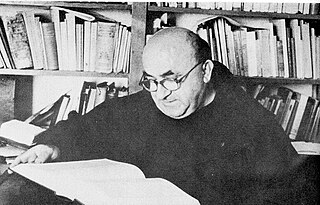
The Pontifical Academy of Mary is an international pontifical organization tasked with promoting mariology. The academy is one of the Pontifical academies at the Vatican in Rome. The PAMI also has the task of coordinating the other Marian academies and societies that exist worldwide and of exercising vigilance against any Marian excess or minimalism. For this purpose the Pope directed that the Academy have a council that examines the organization of congresses, and that coordinates Mariological societies and those who promote or teach mariology.
The following outline is provided as an overview of and topical guide to the Catholic Church:







